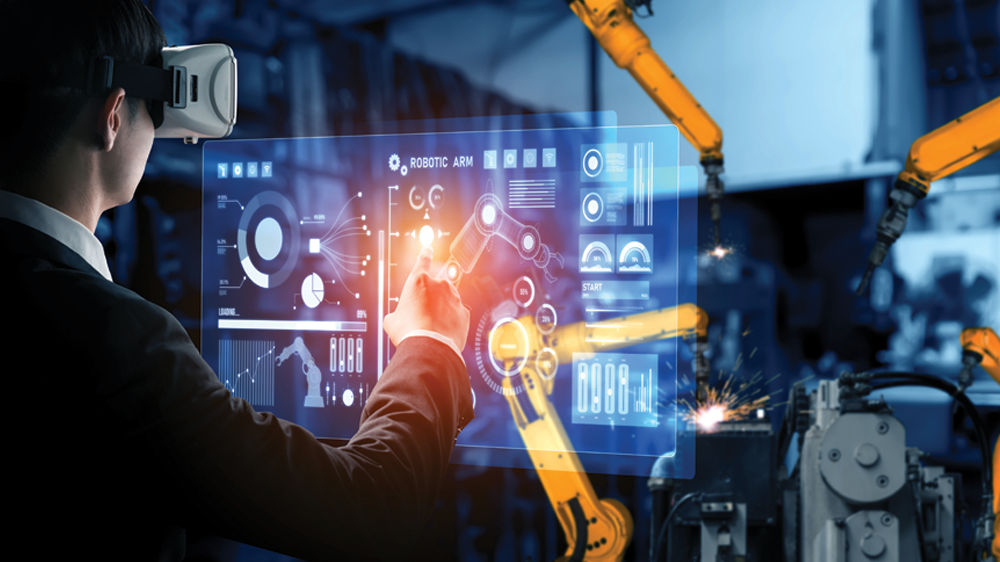Towards a Smart Future
Smart Manufacturing

Indian companies must equip themselves with the requisites, including knowledge, skills, and attitude, to advance technologically and adapt to the changing scenario.
Manufacturing and other industries have seen remarkable pro-gress in technology in the last few years. Technological advancements are fuelling the next industrial revolution. Connected products and systems in factories throughout the world are making businesses smarter and more responsive to the needs of their customers. The primary goal of businesses is to leverage technology to improve efficiency and profitability, increase innovation, and manage safety, performance, and environmental impact. Indian companies need to be prepared for technological advancements with the knowledge, skills, and attitudes to adapt to the changing environment.
Sensor-enabled machines can communicate successfully with other machines, devices, and people, allowing for data collection that may be used to make informed decisions in the changing landscape. Industry 4.0 is a collection of technologies such as Cloud Computing for Big Data and Analytics; Cobots of the Industrial Internet of Things (IoT); Sensors and Simulation; Integration of both horizontal and vertical systems; Cyber Security; Augmented Reality; and Virtual Reality.
Machine-as-a-Service (MaaS) has emerged as a strong manufacturing force thanks to Industry 4.0. By 2022, the market for Machine Learning as a service is estimated to approach US$ 3.754 million. By 2021, it was estimated to be 3.3 billion M2M (Machine-to-Machine) global connections.
All operational aspects of the manufacturing business, from conventional industries like Automotive and Coal to high-end manufacturing, will be brought together in the future by digital manufacturing (miniaturization, printed electronics, etc.). The Boston Consulting Group predicts that by 2025, the percentage of work performed by robots in all manufacturing industries will rise from roughly 10 percent to about 25 percent. An increase in automation, which can increase productivity by 30 percent, can reduce industrial labor expenses by as much as 5 percent annually.
Challenges faced by the manufacturing industry in India
According to CII, a mere 28 percent of India’s industrial Manufacturing sector is equipped with a smart factory. Since the introduction of Industry 4.0, the smart factory has become a crucial part of the industry. As a part of the Government’s ‘Make in India’ plan, linked factories will become a reality. However, there are formidable challenges listed as follows:
Integration
The Indian Manufacturing industry faces obstacles that could hinder the adoption of linked factories. Companies find it challenging to operate with less human oversight.
Interoperability
An infrastructure change may be required when wireless connectivity is implemented. An integrated tool can be used to keep track of inbound and outbound shipments for location-related information, timely order fulfillment, and critical in-transit factors such as temperature, humidity, storage conditions, etc., to bridge the connectivity gap.
Financing
In India, the Government’s ‘Make in India’ project, which aspires to turn the country into the world’s factory and create high-skilled jobs in the industry, is an essential facilitator of linked factories. The decision-making processes of the governing committees and leaders should be clearly outlined.
Sense of safety and security
The most critical consideration is security. Data, communication, and intellectual property rights must be protected. Concerns about data security have arisen as more systems are integrated, and more people are granted greater access to those systems.
Upskilling
The sector is expected to create 100 million new jobs by next year and reach a value of US$ 1 trillion by 2025. It is seeing an increase in demand for social, behavioral, and cognitive skills and attitudes such as crisis management, resilience, interpersonal communication, quick decision-making, and critical thinking. Experts believe that these skills are necessary to generate maximum efficiency from machines being deployed with emerging technologies.
Overcoming obstacles
Even though the Indian Manufacturing industry is rapidly adopting technology, it must address the obstacles that could hinder the adoption of linked factories.
One of the most prominent challenges organizations face is the lack of competent staff to develop and deploy smart solutions. During the transition, factory workers would need time to adapt to the new environment. It’s critical to provide them with the training and time to become proficient.
Inflexibility is a problem for many manufacturers when incorporating new technologies. The majority of factories still use paper-based processes, which needs to change. One of the most prominent challenges organizations face is the lack of competent staff to develop and deploy smart solutions. During the transition, factory workers would need time to adapt to the new environment. As a result, it’s critical to provide them with the training and time they need to become proficient.
Companies cannot afford to neglect the equally important issue of security. They must have mechanisms to protect their intellectual property, data, and communications. Their knowledge of the software necessary to maintain data privacy while allowing them to exchange data and logistics details must be thorough.
The way forward
The Government’s ‘Make in India’ project will be a significant facilitator of linked factories in India. These factories’ ability to integrate global supply chains by enabling real-time information exchange to develop analytical frameworks for improving efficiency will be critical.
Some of the most critical differentiators for manufacturers embarking on connected factories will be a forward-looking mentality, investment in R&D, a talented workforce, and a powerful human-machine interface.
Those that get on board with Industry 4.0 early will gain an advantage over their competitors, while those who hesitate will find themselves irrelevant and left behind.

RRAJESH KHOSLA
President & CEO
AGI Glaspac
sagi@agi-glaspac.com
Source: Magic Wand Media



 Facebook
Facebook.png) Twitter
Twitter Linkedin
Linkedin Subscribe
Subscribe